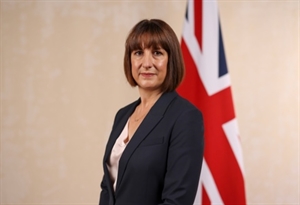Chancellor: "Net zero is the industrial opportunity of the 21st century, and Britain must lead the way"
Wed 29 January 2025
View all news

The Chancellor, Rachel Reeves, has announced that the Government will contribute to investment worth £65m into EV charging company Connected Kerb to improve the availability of infrastructure for those who can't charge at home. In a speech focusing on delivering growth in the UK economy, the Chancellor also announced an investment of £63m into the Advanced Fuels Fund to encourage investment into sustainable aviation fuel (SAF).
During her speech, which was delivered at Siemens' facility in Oxfordshire, Rachel Reeves said: "There is no trade-off between economic growth and net zero. Quite the opposite.
"Net zero is the industrial opportunity of the 21st century, and Britain must lead the way."
Connected Kerb specialises in the installation of slow chargers on streets and at destinations (such as supermarkets). There is a growing challenge to improve the availability of infrastructure for whom home charging is not possible. According to their latest reports, Connected Kerb has installed over 5,500 EV charging points across the UK, making it one of the largest public charging networks in the country. As a result of this new investment, the company aims to quadruple its charging sockets to 40,000, making a significant contribution to the target of at least 300,000 public EV chargers by 2030.
£55m investment will come from the government’s National Wealth Fund (NWF), which will take an equity stake in Connected Kerb, and it includes another £10m in investment from Aviva Investors, bringing a total of £65m for delivery.
Chris Pateman-Jones, Connected Kerb CEO, said: “This is a game-changing investment that will give individuals and businesses the confidence to make the switch to driving electric, dramatically reducing carbon emissions and air pollution. We are delighted to have such high profile investors who are deeply aligned with our sustainability and ethical goals.”
Claire Haigh, Zemo Partnership’s MD said: “Encouraging the development of the public charging infrastructure in this way sends an important signal to the EV market. It also helps to make the transition fairer by beginning to address the challenge of providing accessible, affordable charging options to those without access to their own off-street chargepoint.”
Following announcements of plans to expand airports at Luton and Gatwick, the Chancellor said that the Government also supports long-contested plans for a third runway at London's Heathrow.
To temper opposition from environmental and other groups, Rachel Reeves also announced an investment of £63m into the Advanced Fuels Fund and a plan to deliver a Revenue Certainty Mechanism to encourage investment into UK SAF. She said that she believes that advances in SAF technology will mitigate emissions from additional flights.
Supporting the EV chargepoint announcement, Renault UK's Managing Director, Adam Wood, said (reported by BBC): “Investment in on-street charging infrastructure is especially welcome, both for addressing a critical requirement to give people without a driveway an easy, affordable way to charge an electric car, and for signalling a firm government commitment to making the transition to electric vehicles happen to the timescales it has set with its mandate.
“Today’s announcement gives confidence that legislators are ready to back their ambition with investment.”
The Chancellor also said that the Government will publish a refreshed Carbon Budget Delivery Plan later in 2025 which, alongside the Spending Review, will set out plans to deliver Carbon Budget Six.
Separate reports suggest that the Government is also considering subsidising purchases of electric vehicles by guaranteeing consumer loans. The Government is under pressure from motor manufacturers to help ensure that demand for electric cars matches mandatory targets for sales set out in the Zero Emission Vehicle Mandate (about which the Government is currently consulting).
The Financial Times reports that ministers have started talks with the car finance sector on how to make more low-interest or interest-free loans available to help consumers buy more EVs. By underwriting private loans the Government could help to mitigate the (currently) higher up-front cost of buying an EV.
An earlier subsidy scheme which provided grants to help with the purchase of electric cars came to an end in 2022.
Related Links
< Back to news list